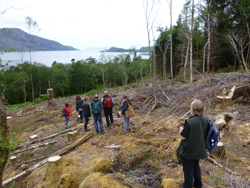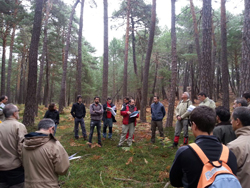Summary
 This project aims to increase the mobilisation of wood from forests and woodlands in Europe by promoting collaborative forest management and sustainable forest management.
This project aims to increase the mobilisation of wood from forests and woodlands in Europe by promoting collaborative forest management and sustainable forest management.
UK regions taking part in the project are:
Research objectives
- Understand the current and future motivations of forest owners
- Promote forest governance and joint action of stakeholders
- Develop multifunctional forest management adapted to forest types
- Integrate forest ecosystem services while minimizing environmental impacts
- Establish improved adapted forest harvesting techniques
- Demonstrate collaborative regional initiatives and solutions
- Recommend tailor-made instruments to policymakers
- Encourage broad outreach and exploitation in EU regions
 Results so far
Results so far
Across Europe there are a great diversity of motivations for increasing the supply and use of wood; e.g., in some countries, biomass is important, in others rural development is the motivation.
In some countries in Europe have a very clear market for wood, such as in the Netherlands where there is a demand for biomass, in others, for example Portugal, there is a lack of a market for timber. However not all woodland owners are motivated by the potential to generate a financial income.
Fragmentation of woodland ownership is a key barrier to wood mobilisation– it makes it difficult for holdings to be economically viable. Other barriers include the composition and structure of forests, forest management systems and practical logistics like access for and appropriateness of available logging systems.
Technical solutions alone will not lead to the mobilisation of wood, social innovation is also needed e.g. people may need to learn new knowledge and skills and change their behaviours. The policies and organisations governing forestry may also need to adjust.
Across Europe there is very little formal evaluation of interventions to mobilise wood supply; informal evaluation is however more common.
Status
The project started in November 2013 and was completed in October 2017.
Results are available from the SIMWOOD website
Current activities
In each of the project’s regions, a detailed analysis has been completed of the present situation, and the barriers and challenges for wood mobilisation which currently exist. Now the project partners are working on identifying objectives, developing possible tailor-made solutions, and selecting some to be tested in a series of pilot projects.
In each region the project has established a Regional Learning Laboratory as an integral part of the research process. This is linked to existing initiatives in the region, and is collaborative: teaming up with regional stakeholders to obtain fresh findings on the region’s specific status quo, chances and proposed solutions to wood mobilisation.
Related Products/Services
Contact
Funders and partners
This project is funded by the EU Seventh Framework Programme. The project consortium includes 28 partners from 11 European countries. In the UK the project involves:
- Forest Research
- Small Woods
- RDI
Forest Research is leading the work on:
- forest governance and its influence on the mobilisation of wood;
- the evaluation of the wood mobilisation pilot projects funded by the project.
Forest Research will also contribute to the implementation of wood mobilisation pilot projects in the UK and will help to develop policy tools and practical management solutions. It will disseminate and encourage uptake of the project findings.
